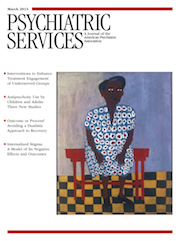Rainbow Beneath the Sky: Mental Health Help for Chinese Americans
Mental illness is a difficult subject for Chinese Americans. Fearful of “losing face,” many Chinese Americans do not seek help for their psychiatric needs. Lack of mental health knowledge may affect their capacity to access care earlier, before the problems become severe. For Chinese-American immigrants, language barriers can also limit their ability to accept mental health services. Practical strategies to overcome these barriers include community outreach efforts and involvement of family members. Chinese-language mental health resources for the general public, particularly via mass media, are necessary to reduce stigma in this vulnerable community.
Los Angeles is a major metropolitan area with a large Chinese immigrant population in which Cantonese is one of the two most commonly spoken languages. In the Greater Los Angeles Metropolitan area, KMRB 1430AM is the only Cantonese radio station that broadcasts 24 hours a day. It reaches approximately 52% of this Chinese immigrant population. The radio station decided to produce a program about general health and mental health concerns. Titled Rainbow Beneath the Sky, the program first aired in 2009 and is broadcast Monday through Friday from 7 to 8 p.m. Because the radio program host is committed to reducing the stigma of mental illnesses, one day per week is focused on mental health and well-being topics, which have included palliative care, dementia, healthy aging, and depression.
As a psychiatrist who is fluent in Cantonese, I have been a bimonthly guest on the program since April 2009. On alternate weeks, members of other disciplines may be speakers. Before a show airs, I send the radio program host a topic outline. During the show, the host and I go over questions and answers regarding the topic of the day and discuss hypothetical cases. Audience members may submit their suggestions and questions via e-mail, Internet, or voice mail. The feedback has helped to clarify the mental health needs of the program’s listeners.
Most audience members inquire about referrals to Chinese-speaking psychiatrists for themselves or for their loved ones. Typical examples include the following: “Patient is American-born Chinese, mother is from Taiwan, [and they experience] many cultural conflicts. Please refer a Cantonese doctor.” “I am a new listener from another state and enjoy your program very much. I cannot find a psychiatrist who is Chinese in my area.” “Patient stays home all the time, does not want to work or go outside due to some unpleasant experiences. I am very worried. Should he see a good Chinese psychologist, psychiatrist, or young adult therapist? If you don't know a Chinese-speaking doctor, English is fine.” “She is very afraid to go to bathroom, very afraid to make phone calls, very nervous. She thinks that she is abnormal. Where should my friend find help?”
The radio program has served to explain the differences among mental health professions and when to seek help. The radio host, Julie Cheng, has been instrumental in lending her expertise to an audience in need of emotional support and advice. The program staff attempts to refer most listeners to psychiatrists or community mental health centers that have linguistically and culturally appropriate staff. But even in a major metropolitan area such as Los Angeles, there is a shortage of Chinese bilingual psychiatrists, and language differences create barriers to obtaining the standard of care that others may take for granted.
Audience members have sent e-mails suggesting topics for upcoming radio programs, such as teenage problems, healthy aging, and how to support others with emotional issues. On one special occasion, a patient with bipolar disorder who was experiencing recovery with medications volunteered to share on the air his struggles with the illness. He recounted that when he was ill, he would not sleep for weeks and threatened to burn his house down. He also shared how he would stop medications abruptly, as soon as he felt better. He spoke eloquently, explaining to the general public that it took him years to finally realize the importance of medication ad-herence.
Rainbow Beneath the Sky has also become a way to invite Cantonese-speaking immigrants in Los Angeles to attend health information workshops. I had about 230 participants in a recent mental health workshop, and 32% (N=74) were recruited through the radio program. Our program helps demonstrate that media advocacy is effective in improving access to care and treatment for ethnic minority groups, and it offers a glimmer of hope that stigma may be slowly disappearing in the Los Angeles Chinese community.



